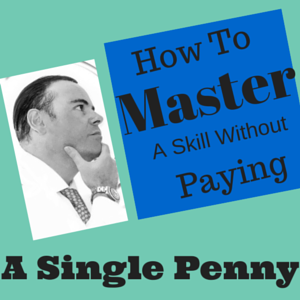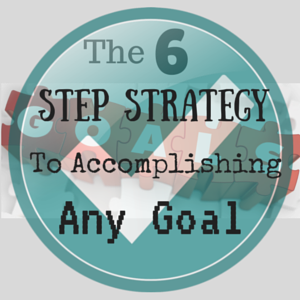
Which new skill have you been trying to learn lately? Whether you want to bake cookies the right way or get more Twitter followers, the web has made it possible for us to learn any skill that we want to learn.
With free information available on YouTube and the countless blogs on the web, we don’t have any excuses. The information is hidden in front of us, but with Google, finding the needle in the haystack isn’t as challenging as it was before.
While it is possible to learn a new skill quicker with the appropriate book or training course, it is possible to learn a new skill for free. I learned everything I know about social media without spending a penny. Now I primarily buy books and training courses about social media to expand upon my knowledge.
When I want to learn a new skill fast, and for the price of zero, I use this process:
Step #1: Research
The first step is where Google truly shines, and it also highlights the difference between our current era and life without the internet—a life that is foreign to me (how the heck did people go to the library every day in the winter for their information?).
When I want to learn something new, I will search the appropriate phrase into Google. Right now, I am mastering the art of podcasting free of charge. I will not buy a book or training course until I am already successful with my podcast and ready to expand upon my knowledge.
After I type in the search phrase (in this case, “podcasting tips”), I click on all of the links on the first two pages of Google. Then, I read the articles.
Depending on what you are trying to accomplish, you should also watch five YouTube videos related to the skill that you are trying to master. Several skills require visual learning in addition to reading articles on the web.
Step #2: Copy and Paste (Yes You Read That Right)
Who knew that advice we have always shunned can actually help us learn new skills? I have a document on my computer with numerous podcasting tips from the experts. However, I am never going to include the document in one of my books or put it on my blog. I especially wouldn’t claim ownership of the document. That would be plagiarism.
The reason why so many people forget what they learn on the web is because they look at the information once. Although some people unintentionally stumble across the same article twice, most people will only read an article once and only go back when they have forgotten what the article said (but remembered the value).
When I read articles on the web about podcasting, I copy and paste all of the best tips that I didn’t know before into the document. It currently has over 1,000 words and several pictures. Instead of going back to the articles I looked at earlier, I just go back to the document. All of the information is in one place.
I never copy and paste links to actual articles on the web since I don’t want to go back to them. However, I will copy and paste links to YouTube videos and identify the important times of the video down to the seconds.
Step #3: Apply
No matter how much knowledge you absorb, you won’t remember it forever (unless you have a perfect memory). You don’t want your knowledge of a particular skill to wither away. The copy and paste technique (yes, I just called it a technique) allows you to remember knowledge. Just look back at the document and you’ll remember.
However, just because you remember knowledge does not mean that knowledge is serving you. If I never started my own podcast show, then the knowledge I obtained about podcasting is meaningless. That knowledge won’t help me reach the next level.
The next step was start my own podcast. Just like anything we start, starting is initially scary, but with practice, we become comfortable. Comfort in your area of expertise allows you to expand upon your knowledge easily produce high value work.
Step #4: Write A Blog Post About The Skill
Guess what you’ll be seeing from me in the near future? That’s right, an in-depth blog post all about making a podcast become successful. I will use the document I mentioned earlier for inspiration just as people use articles on the web for inspiration for their blog posts (both approaches lead to the same result).
Obviously, the blog post won’t involve any copying and pasting. Instead, I am going to describe podcasting in my own words based on the information I have obtained and lessons I have learned from analyzing other podcasts.
You can’t say you have mastered a new skill until you can successfully describe the process of mastering that new skill in your own words. Then, at that point, you must consistently practice the skill.
Step #5: Shoot A Video About The Skill
The great thing about writing a blog post is that you get to pause and look for information to double-check your facts. If you were having a conversation with someone about your skill, those options don’t exist (they technically do exist, but how awkward would it be to have a long pause or say, “Let me just make sure with a Google search that what I said was right”).
You can put a skill’s mastery into your own words with a blog post, but shooting a comprehensive video about your skill puts you on another level. Now, you can effortlessly talk about your skill. Take a look at the most successful people in any industry and listen to their interviews. Nearly all of them are able to effortlessly talk about mastering a particular skill as if these people started learning the skill since they could walk.
It may take a few videos to effortlessly talk about the skill you are trying to master. Practice will allow you to become better.
In Conclusion
The web has eliminated our excuses by providing us with enough information to master any new skill. What skill are you trying to master? Do you think the web has enough information for anyone to master any skill? Sound off in the comments section below.




